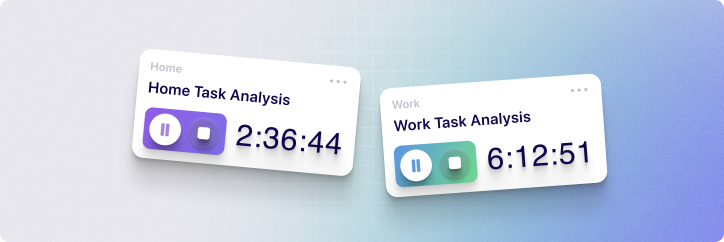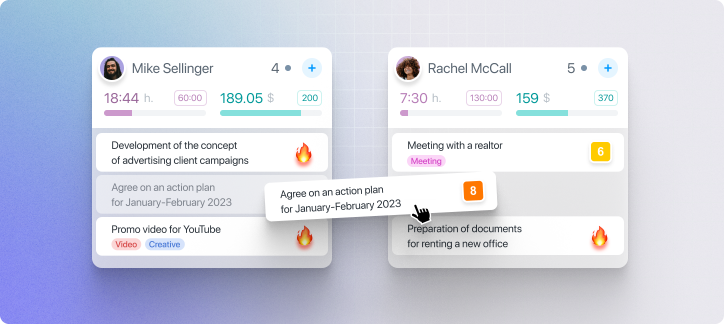The idea that work tasks can be solved faster and more efficiently than now, periodically occurs to many people. It is followed by dreams about how to spend free time: walking, reading, studying, traveling, spending time with family and much more.
Unfortunately, thoughts often do not turn into real actions, and overtime is becoming more and more frequent. But, if you remember the importance of time management at the workplace, it is quite possible to get rid of overdue tasks and the stress associated with them. And if you develop the skills of managing working time, then sometimes it will seem to others that you are just a magician.
What is Time Management?
Time management is the ability to effectively use limited time to solve the maximum number of tasks. Those who use time management at the workplace work less than those who do not. This is due to the fact that without planning working hours, employees are faced with:
- broken deadlines;
- a large number of errors;
- lack of time for both work and personal life;
- increasing level of stress;
- damaged reputation.
As a result, it is necessary to spend time correcting the situation. But people who actively practice time management in the workplace and khow time management benefits almost never face such problems.

At the same time, we all have only 24 hours in a day. From this time, there are seven to eight hours of sleep, one to two hours for commuting to office and back, and two to three hours of household chores. It turns out that time management helps to use the remaining ten or twelve hours most effectively and to have time not only to work, but also to have time for hobbies, family and self-development.
How to Implement Time Management in Your Life?
This is possible even if you are used to working without a clear plan and the maximum you rely on is a list of tasks in the task tracker. The main thing is to realize that the time has come for a change and now you will pay attention to the management of working time.
It is also important to understand that tasks will now have to be prioritized, and the work schedule will have to be revised. These tips will also help you:
- Set macro goals, but understand that micro steps lead to them. Sometimes we get excited about an idea, we want to quickly implement it and get instant satisfaction from it. But at a certain stage, inspiration disappears and the understanding comes that there will be no quick result. To prevent this, immediately divide the big goal into small tasks and write down how long it will take.
- Stop imagining how your workday goes, start recording how it actually happens. Many people are faced with the fact that they have spent the whole day at work, but there is no measurable result. It turns out that you only thought you were working. Yes, you can say that you have looked through the materials in search of inspiration. But when this happens day after day, something is wrong. Therefore, record what exactly you did during the day. In this way you will not imagine that you worked, but know exactly what you did.
- Learn to forgive yourself. Accept in advance that on the way to effective time management, you will make mistakes. Just record these errors and options for their correction.
Why is Time Management Important in the Workplace?
It has a number of advantages that positively affect the career and the level of job satisfaction.Increasing productivity and efficiency
When you use working time management, you clearly understand how much time it takes to complete one task or another in fact and according to plan. You also know which of them are the most important and which tasks are related to the tasks of colleagues.
Accordingly, you will first allocate time for what is more important and complete it without delay, and you can devote the remaining time to less important tasks. Doing this will not only increase your productivity, but also the effectiveness of the team as a whole.

Completing tasks on time
Time management in the workplace helps to meet deadlines. Because they are indicated in the plan and tied to specific dates in the calendar. That is, you do not have tasks without set deadlines. And even if they do exist, their priority is correspondingly low.
Decreased stress
When you don't have time for a lot of things and you realize it, the stress level automatically increases. This has a bad effect on physical and mental health. Time management allows you to get rid of such moments or eliminate them. Accordingly, you get less stress, and do not do harm to your health.
Increasing the quality of work and decisions made
Among the benefits of the time management in the workplace is improving the quality of your work. This becomes possible due to the fact that you do not do anything at the last moment in conditions of shortage of time. So, you can complete the task well, and then also check what you have done.
As for decision making, it also goes a level higher. When you manage your time, you can set aside time to analyze information, understand the essence of the problem, and think about solutions.

In addition, with workplace time management, the levels of fatigue and stress become lower, as we have already noted above. And decisions made in a state of balance usually lead to better results than those made by an exhausted person.
Reducing procrastination
Time management helps you understand when and what is in your area of responsibility. That is, saying to yourself "you can think about this problem tomorrow" will not work. Time management allows you to understand your workload, manage it and procrastinate less.
Improving the quality of life by achieving a work-life balance
When you understand the value of time and know how to manage it, you have time to work, rest, and do other important things. The quality of your life becomes higher, you choose what and when you do, instead of trying to make time for something without thinking about quality.
For example, you know that you will complete all work tasks on time, find time to choose a vacation destination and a hotel that meets all your requirements, choose tickets at a good price, and go to the destination place at the specified time. This is how the number of pleasant emotions and the level of self-satisfaction increases.

If you do not manage time, you will choose the travel destination at the last moment, when you will not actually have much choice, you will have to forget about favorable prices, and you will have unsolved problems in your head.
11 Steps for Better Time Management at Work
Make a plan
If you do not have a plan for a specific period of time, there is a good chance that you have simply forgotten or will forget about a significant part of your work tasks.
Therefore, it makes sense to plan what needs to be done, for example, within a month. The plan can take the form of a simple to-do list.
Make a schedule
It’s good when you have a plan. But it is likely that things that you don't want to do will remain out of focus and at the end of one month it will become clear that they are being carried over to the next.

The schedule will help to get rid of this. It is necessary to clearly indicate what tasks are planned for the day, as well as the hours allocated for them. For example, you will know that every Tuesday you prepare a report for the week from 9 to 1 in the morning, and every Friday from 1 to 2 p.m. you collect references for future posts on the social network. Time for rest is also to be included in the schedule.
Prioritize and delegate secondary tasks, if possible
Determine which tasks are the most important from the point of view of achieving strategic goals. Put them in the schedule. Plan everything else around the main tasks.
If there are things that can be done by anyone else, delegate them to that employee and spend your time on the things that only you can do best.

To simplify work on prioritizing tasks, you can use the tips in this article.
Find out what hours are most productive for you
Analyze your working day and note when your brain works best. It may be morning for some people, and evening for others. Record it and work in productive hours on difficult and important tasks. Things that do not require concentration and creativity can be done at any time, for example, answering emails.
Get rid of distractions
We are often afraid of missing something important in the news, messengers or social networks, so we are often distracted by them. After a short switch, it is difficult to return to work again. Someone can focus on the consumption of content and not notice how fast time has gone by. Therefore, blocking such resources on the work computer can be a good solution.

Explain to others when you should not be disturbed
When you are just starting to use time management for work, it is better to tell colleagues and family about it and explain that there are hours when you work very hard and cannot afford to be distracted even for a minute.
Say, for example, when your Slack status is Do Not Disturb, you won’t be able to reply to messages.
Give up multitasking
Studies in Stanford have shown that constant work with several tasks simultaneously leads to worse long-term and short-term memory. That is, over time it will be more and more difficult for you to focus even on one thing. Therefore, perform the tasks consistently and break this rule only as an exception.
Plan your breaks
After a period of intense work, you should have some rest. But you need to choose the right option for a break. If you work at a computer, step away from it, go outside and get some fresh air. Psychological research proved this option to be the most useful.
In addition, after breaks the ability to focus your attention is enhanced and you can improve your performance capacity.
Accept the fact that you have limitations
Don't think you're superhuman. It is ok to have rest after doing a complex task, and sometimes to do simple routine tasks.
Trying to work at your best all the time exhausts the body, which can lead to poor health or burnout.
Change the way you communicate with colleagues
Staying in contact all the time is difficult, and sometimes unnecessary. Therefore, you can work out the communication algorithm with colleagues. For example, all questions that do not require an immediate response are sent to the mail. Only urgent items go in the chat.
You can also establish hours when you are not available for communication, for example, during non-working hours and when working on important tasks.
Control your resources
You need to understand how much time you and your team can work in total. You should also know how many hours a particular task requires. With these metrics under control, you can manage your team's time and your own.

That is, you know that there are three employees in the team, each of them works 8 hours a day. A project comes that requires 50 hours, but you are asked to complete it in one day. You have every right to say that this is not possible with the existing team and ask for either a postponement of the deadline or assistants who can take over some of the work. Of course, you will have to report on the time spent, and for this you can't do without a time tracker and task manager.
Now you know the advantages of time management and how to work with it. It's time to choose time management tools and start practicing.
